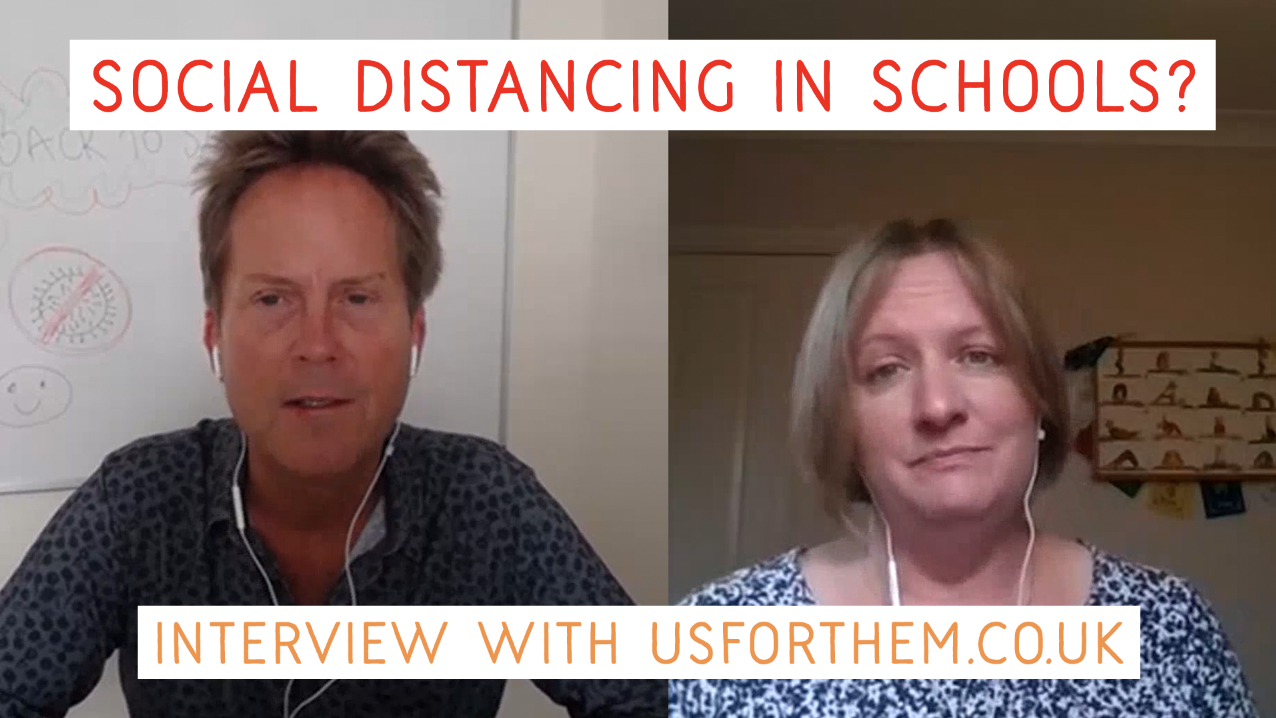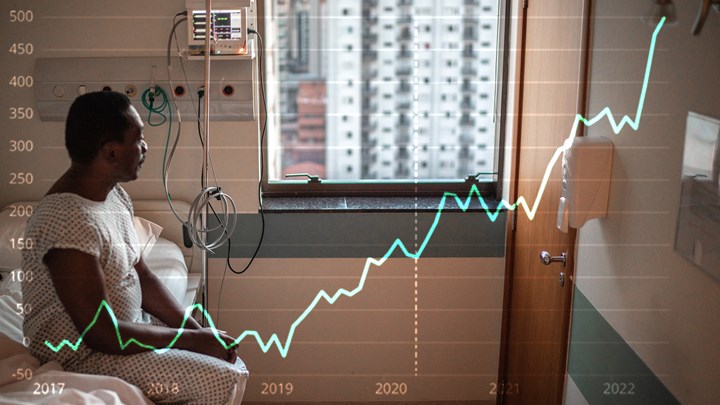ANH Founder, Rob Verkerk PhD, had a 20-minute, socially-distanced Skype chat with Christine Brett who's in the front lines of getting UK kids back to school - naturally and normally, without the massive disruption, psychological damage and reduced quality of education that would be caused by social distancing and related measures.
That's before you look at the potentially huge, multi-dimensional impact on often very under-resourced, time-challenged teachers. Where is the risk/benefit assessment that takes into account all of the negative potential impacts of imposing social distancing in children's main learning environment? There isn't one.
Check out the 18-minute interview below.
>>> Download PDF of guidance document: Immune Support Protocols to Support a Return to School
Note: You will see an advertising banner beneath our videos that play off the Brighteon platform (when they are not maximised). This advertising helps support the Brighteon platform that doesn't charge subscribers for their content, is committed to free speech, yet is also respectful of copyright-related law. We'd like to clarify that no advertising revenue from Brighteon is received by the Alliance for Natural Health Intl.
For those who'd rather read than watch, we also, separately, asked Christine some key questions about the Us For Them campaign that profiled Rob's coronacast from last week on school closures and reopening.
Interview
1. What made you come together to create the Us For Them campaign? Who are you - when did your campaign kick off, who are the team members behind it? What are your drivers? Tell us a bit about yourselves.
The three of us met on social media just a week ago, we bonded over concern that the welfare of the children wasn't being considered in the debate about schools opening. No-one in a position that traditionally advocates for children is speaking out so we feel that we have no option but to ask the question about whether the harm from proposed measures has actually been considered. We want schools to reopen but with sensible infection control and without social distancing measures BETWEEN children which we feel is extreme and highly damaging to their wellbeing.
2. You're calling on immediate school reopening and then a proportionate approach to using the government's 5 point guidelines that includes things like more frequent hand washing, minimising contact with those who're unwell and good respiratory hygiene based on 'catch it, bin it, kill it', and then finally, the change of classroom layouts and timetables that's particularly controversial. The first question I want to ask about this hierarchy is what do you mean by a proportionate approach - who decides and how might this work practically in say a nursery or primary school?
We understand that children can’t go back to school in the same way that they left. However, we need to remember that the most important aspect in controlling the virus and preventing transmission is that children who are unwell stay away from school. After that there are some sensible hygiene precautions such as washing hands regularly and sneezing into a tissue or elbow, that can be taken along with regular cleaning of settings to prevent transmission. The measures can be adopted without detrimental effect to children.
3. Back to the government's hierarchy, the wording of the final point "minimising contact and mixing by altering, as much as possible, the environment (such as classroom layout) and timetables (such as staggered break times)" is a little odd in that the focus seems to be on disrupting kids learning environment as much as possible, not trying to minimise risk to kids. What's your take on the actual wording - and could it be altered to make it clearer as to its intent and could this make things clearer, easier and less disruptive for children, teaching staff and school administrators?
It is not clear how far the benefit from this last measure of minimizing contact between healthy children justifies the considerable harm that it will do. Children are social beings and need to play and interact to develop. What does it mean to be isolated in a group? This means no team sports, no drama plays, nor group work, no connection. We do not believe that there should be any social distancing between children in schools. Children have already been negatively affected by the closure and the proposed measures for school openings will further compound and extend that damage. The measures proposed are making it more difficult for children to readjust to coming back to school after an extended period of absence.
4. What's the Us For Them take on the actual risks to children - and can you define these risks, because they're certainly not limited to risks of disease from the virus, are they? Could you give us a kind of top line view on what you think the risks might be especially on wellbeing and educational development if there was no social distancing versus risks with social distancing as planned with pupil bubbles, minimised mixing of groups and so on?
We know that the risks from the virus in children are thankfully very low. However, the focus has been on risk of virus in schools, with no discussion about the risk of social distancing itself for children. There are decades of research that show you cannot enforce social distancing in a fundamentally social species without serious negative consequences. We know from the research that the need for social support is greatest in times of adverse situations and events such as the current pandemic. Children who are socially isolated tend to perform worse at school, suffer more from emotional and mental health issues as well as being more likely to be obese and susceptible to addiction. Of course, vulnerable people who are at higher risk should be protected but we should not put healthy children at risk of impaired social development and mental health issues, in order to reduce the spread of a disease that mainly causes direct harm to adults.
5. Why do you think all this is happening - has the nanny state just gone mad, is it a misunderstanding of the science, have we become too reliant on siloed scientific evidence so we've lost our ability to look at the big picture - or could there be, dare I say it, a more sinister objective? What d'you think is actually going on - because a lot of people out there seem to have this same question running around in their minds.
We realise that people are scared. Focus has been on parental reluctance to return children to school; but in fact some do not want their children to return because they fear damage from the measures. I think parents are so scared that they are not being able to accurately assess the risk to their children and they are struggling to understand the relative risks of physical safety and psychological well-being that will be damaged by these measures. The virus is only one risk that children face but our focus on that risk is overshadowing the need to protect children’s overall wellbeing.
6. If there's one thing you'd like to see the government agree in the next 30 days linked to your campaign, what would this be?
We are calling on the government to open schools for all pupils without social distancing measures between children; so no bubbles and normal interaction with sports, drama, regular playtime. The Royal College of Paediatricians and Child Health in the response to schools reopening states that, “The concerns and voices of all concerned, including those of children and young people, should be heard respectfully. The discussion of risk cannot only be about the risks of COVID-19.” We believe this discussion of risk must now also balance the risk to children of detrimental social distancing measures proposed .
7. Final question - how can people get involved and show their support?
Please sign and share our petition at www.usforthem.co.uk to stand up for your child and protect their future development. On our website you will also find template letters to send to your MP and your headteacher. We are a small team and so are looking for anyone especially with campaigning, PR or expertise in educational psychology to help us highlight that social distancing in schools is #NotOK.
>>> Visit ANH Covid Zone where we curate all our Covid-related content
>>> Back to ANH International homepage








Comments
your voice counts
There are currently no comments on this post.
Your voice counts
We welcome your comments and are very interested in your point of view, but we ask that you keep them relevant to the article, that they be civil and without commercial links. All comments are moderated prior to being published. We reserve the right to edit or not publish comments that we consider abusive or offensive.
There is extra content here from a third party provider. You will be unable to see this content unless you agree to allow Content Cookies. Cookie Preferences